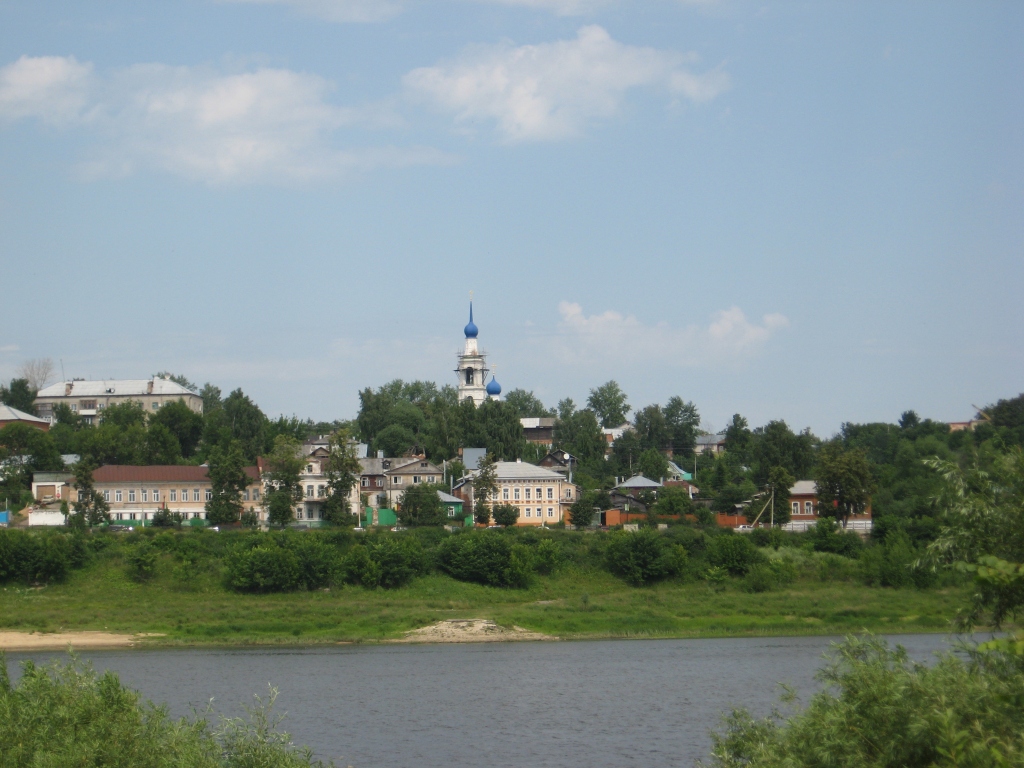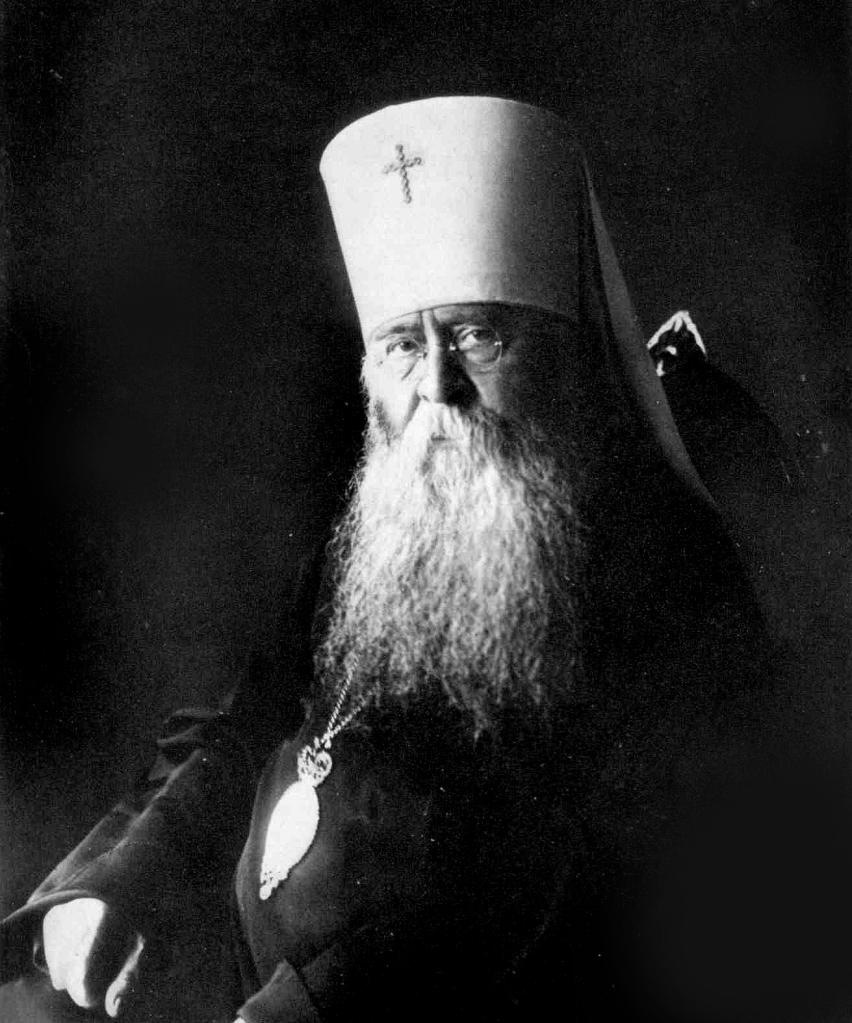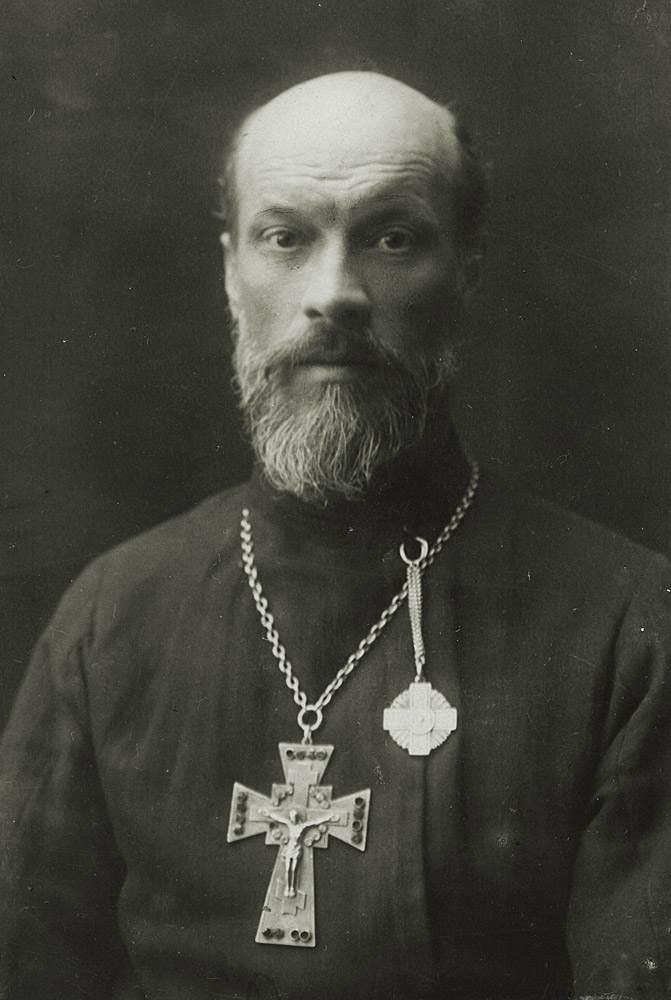Part 1: Reminisces of Clergy and Monastics
“Everyone in Our Family Were Prepared to Suffer and Die For Christ” by Archpriest Vladimir Pravdolyubov, the Reverend Rector of St Nicholas Church in Kasimov, Ryazan Oblast
Some New Martyrs and Confessors in our Family

I was born in 1931 into an Orthodox family, within which were a few new martyrs and confessors. My father, archpriest Sergei Pravdolyubov, was glorified as a confessor. Besides him, my grandfather Anatoly Pravdolyubov, my uncle on my mother’s side archpriest Mikhail Dmitryev, and my cousin on my mother’s side the reader (and soldier) Yevgeni Feodorovich Dmitryev, were all glorified in 2000 at the Jubilee Council of Bishops for their martyrdom in 1937.
Up to my birth, my father had already been arrested two or three times (the labor corps in 1918, more often than not, started with arrest). He was three times faced with the possibility of death. I was the sixth and last child in a family in which everyone was ready to go without, suffer, and die for Christ. With that in mind our family appeared to be a little island of like-minded people, which made life much easier.
I’ve carried two events from my earliest childhood days, which I learned from the conversations of my elders. We lived very poorly, and one day my 15-year-old sister, Sophia, asked mama for sweets, and in reply mama told her “Pray to God for him to give you sweets.” And so she placed a 1-year-old me on a stool, after which she climbed on the same stool, and we started to pray. As a grown woman she explained, “We probably got atop the stool in order to get closer to God.” Right after our prayer an older woman arrived and said, “I’ve wanted for a long time to bring some candy to your children and decided just now to do so.” So, Sophie and I received as we had asked.
Second was when in 1935 my papa was arrested. They led him from the jail to the police station for interrogation directly past our window. I yelled at the window, “Papa, where are you going! Papa! Come home!” which brought the adults to tears.
Another episode from my childhood happened thus (I also do not remember this myself, knowing only from recountings). Some nuns, who were part of the church choir with us, placed me on a stool at the reader’s stand to read the Six Psalms [Ps. 3, 37, 62, 87, 102, 142 greek numbering]. I read fairly well, but suddenly fell silent at some point, and tears poured down my face. One of the nuns continued the reading, and I was taken off the stool and placed on a small bench to relax.
The Strictly Aligned Orthodox Position

The clergy in Kasimov were friendly. They rallied together especially at the time of the revolution and collectivization. The soul of this brotherhood was my father – archpriest Sergei. He preached excellently, and his sermons were taken by other priests and read in their own churches. This is connected to a certain event.
Preceding this was a great tragedy: the clergy of Ryazan with the bishop at its head joined ranks with the Renovationists (a state-sponsored church in league with and preaching from the pulpit the ideals of the communists). The Most Holy Patriarch Tikhon forbade them and placed in Ryazan the very energetic Bishop Boris (Sokolov). This bishop, set against by the persecution of the clergy, said from the ambo, “Your priests are only striving to plunder your pockets! Have they explained the liturgy to you?” and the people raised their voices saying, “They’ve explained, Master!”
What had happened was this: Father Sergei in his own Holy Trinity Church had delivered a series of sermons with explanations of the liturgy. The priests, with permission from Father Sergei, read them in their own churches just before the bishop’s arrival. And in general, the priests had tried hard together to work out the correct relationship one should have to the realities of that time, about which the words of Father Sergei were often decisive.
Before the clergy, besides others, laid two problems. First, how to relate to the new emerging society – the Party, Komsomol, trade-unions, collective farms. Secondly, how to relate to Metropolitan Sergei (Stragorodskiy) and his actions. The fact that after the Declaration of 1927 there were no “forgotten ones”, is largely due to the service of Father Sergei.
Still St Tikhon in his epistles implored believers to not be infected by the malicious authorities who so hate the church. But the position of His Holiness Sergei (Stragorodskiy) (“Being strictly Orthodox, we must be loyal citizens of our country: her joy must be our joy, and her sorrow our sorrow) – altogether not an “unacceptable compromise”, but a strictly aligned Orthodox position, which appeared in all force in the years of the Great Patriotic War.
Father Sergei specially noted that the apostles commanded subjection to authority, not out of fear, but out of conscience at such times that heads of the government hunted christians, like under Nero. He loved to refer to the First Epistle of the Apostle Peter: “Fiery Temptation”, in which it says that there were burnings of christians in bonfires, especially colorfully depicted in the novel by Sienkiewicz “Quo Vardis”.
Citing the words of the apostle: “But let none of you suffer as a murderer, or as a thief, or as an evildoer, or as a busybody in other men’s matters. Yet if any man suffer as a Christian, let him not be ashamed; but let him glorify God on this behalf.” (1 Pet. 4, 15-16), Father Sergei pointed especially to the words “busybody in other men’s matters”, connecting to them any resistance of authority. The authorities order “renounce Christ!” – after the examples of the ancients say “I cannot!”. — “We will jail you!” – obediently, without any protest, go to jail then. As such our clergy preserved their unity around Patriarch Sergei. Such this hard question for many was decided.
As a result of such relations to authority the first question was resolved. If membership in an organization demanded renunciation of God (ie. the Party, Komsomol and from it the pioneers and little octobrists), to be a member was forbidden, whatever deprivation or torment may be threatened for nonparticipation. However, if renunciation of God is not required of you (such as in the trade unions and collective farms) then it is not only permissible to be a member, but if the authorities require it, then you must. And to slogans such as “Trade unions are the school of Communism” or “We don’t need Chirst, but we need collective farms” one need not pay attention (of course one should not pronounce such things oneself). To see that such a position was relevant to our day, it is enough to remember the turmoil over the INN.
(translator’s note: the INN in many post-soviet countries including Russia is a taxpayer identification number. When the measure was introduced by the Russian Federation there was a panic in some religious circles, Orthodox included, urging believers not to get an INN due to seeming resemblance to the idea of the Mark of the Beast in the book of Revelations. The clergy leading the charge against the INN recanted their positions)


